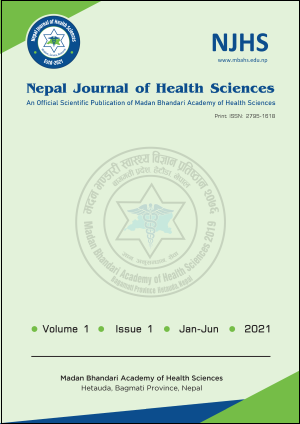Assessment of Knowledge and Attitude Among College Students Toward Umbilical Cord Blood and its Banking
DOI:
https://doi.org/10.3126/njhs.v1i1.38493Keywords:
Attitude, Knowledge, Fetal blood, StudentsAbstract
Introduction: Umbilical cord blood (UCB) is a good source of haematopoietic stem cells and progenitor cells. UCB stem cells are used in treatment of a variety of blood and bone marrow diseases, blood cancers, metabolic disorders and immune deficiencies.
Objective: This study aimed in investigating college students’ knowledge and attitude about UCB and UCB banking.
Methods: It is a descriptive cross-sectional study. The study was conducted in East West College of Management, Bangalore, India from September 2018 to August 2019. A total 80 college students were selected by random sampling techniques. There were self-structured questionnaires used to assess the knowledge and attitude regarding UCB and UCB banking. The data analysis was done using descriptive and inferential statistics in SPSS version 21.
Results: The maximum number of participants were from age group 19-21 years followed by age group 16-18 years. The overall knowledge score was 21.05±5.11 with mean percentage score of 60.14. The 71.25% (57) of subjects had moderately adequate knowledge; whereas, 25% (20) of subjects showed adequate knowledge. Similarly, the overall attitude score of subjects was 61.5±5.17 with a mean percentage score of 51.25%. Out of the total participants, 90% (72) had neutral attitude, 10% (8) exhibited positive attitude and none of the subjects exhibited negative attitude towards UCB banking. There was no association found between knowledge and sociodemographic variables and between attitude and sociodemographic variables.
Conclusion: The majority of the respondents had moderate knowledge and maximum had neutral attitude on umbilical cord blood and umbilical cord blood banking.
Downloads
Downloads
Published
How to Cite
Issue
Section
License
Copyright (c) 2021 Namita Yadav, Vita Leena D'Souza, T. Geethamani

This work is licensed under a Creative Commons Attribution 4.0 International License.




